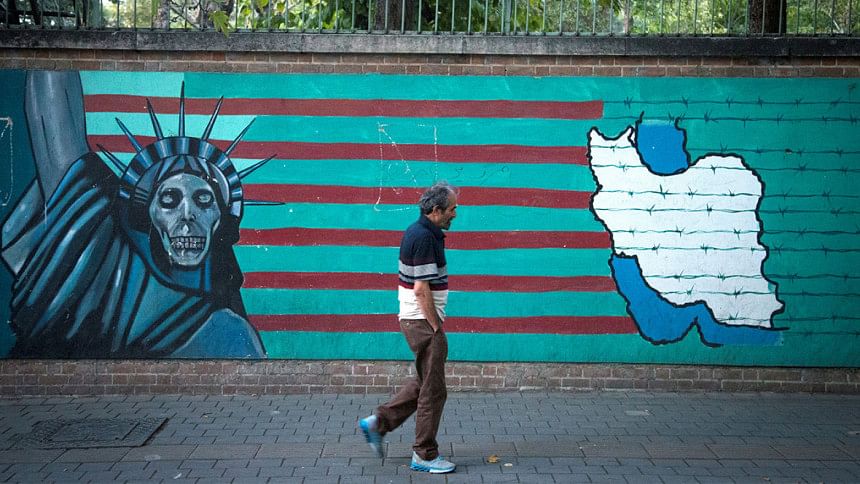Iran slams US 'psychological warfare'

Iran's President Hassan Rouhani said yesterday that Washington's call for new nuclear negotiations at the same time as it reimposes crippling sanctions "doesn't make sense" and is an attempt at "psychological warfare".
"If you're an enemy and you stab the other person with a knife and then you say you want negotiations, then the first thing you have to do is remove the knife," he said in an interview on state television.
It was his first response to US President Donald Trump's offer of talks on a new deal to replace a 2015 pact he abandoned in May, and came as Iran braces for the return of sweeping US sanctions today.
"They want to launch psychological warfare against the Iranian nation," Rouhani said. "Negotiations with sanctions doesn't make sense."
Trump's withdrawal from the historic multilateral accord in May infuriated his European partners.
The first round of sanctions takes effect overnight, targeting Iran's access to US banknotes and key industries including cars and carpets.
"The Iranian regime faces a choice," Trump said in a statement. "Either change its threatening, destabilizing behavior and reintegrate with the global economy, or continue down a path of economic isolation."
"I remain open to reaching a more comprehensive deal that addresses the full range of the regime's malign activities, including its ballistic missile program and its support for terrorism," he added.
Iran's currency has lost around half its value since Trump announced the US would withdraw from the pact.
That has ramped up tensions inside Iran, which has seen days of protests and strikes in multiple towns and cities over water shortages, high prices and wider anger at the political system.
Severe reporting restrictions have made it impossible to verify the swirl of claims coming through social media.
Journalists did however confirm a heavy build-up of riot police and a mobile internet blackout Sunday night in the town of Karaj, just west of Tehran, which has been a focal point of unrest.
European dismay
The second phase of US sanctions, which takes effect November 5 and will block Iran's oil sales, is due to cause more damage, though several countries including China, India and Turkey have indicated they are not willing to entirely cut their Iranian energy purchases.
EU diplomatic chief Federica Mogherini said the bloc, as well as Britain, France and Germany, deeply regretted Washington's move.
"We are determined to protect European economic operators engaged in legitimate business with Iran," she said in a statement.
Iran's Foreign Minister Mohammad Javad Zarif said the global reaction to Trump's move showed that the US was diplomatically isolated.
"Of course, American bullying and political pressures may cause some disruption, but the fact is that in the current world, America is isolated," Zarif told reporters Monday, according to the semi-official ISNA news agency.
But many large European firms are leaving Iran for fear of US penalties, and Trump warned of "severe consequences" against firms and individuals that continued to do business with Iran.
Rouhani's government has taken emergency measures to stem the collapse of the rial and brace for the return of sanctions.
On Sunday, it eased foreign exchange rules, allowing unlimited tax-free currency and gold imports, and reopening exchange bureaus after a disastrous attempt to fix the value of the rial in April led to widespread black-market corruption.
With senior religious authorities calling for a crackdown on graft, the judiciary said Sunday it had arrested the central bank's foreign exchange boss, along with a government clerk and four currency brokers.
The measures appeared to calm the markets on Monday, with the rial strengthening to 95,500 to the dollar -- up a fifth on its record-low of 119,000 a fortnight ago.
Sanctions and talks
Two countries that have welcomed increased pressure on Iran are its key regional rivals, Israel and Saudi Arabia.
Israeli Defense Minister Avigdor Lieberman described the renewed sanctions as "a courageous decision which will be remembered for generations."
There have been ongoing rumours that Trump and Rouhani could meet in New York in September at the UN General Assembly -- though Rouhani reportedly rejected US overtures for a meeting at last year's event.
But that came less than a fortnight after a bellicose exchange between the two presidents, with Rouhani warning of the "mother of all wars" and Trump responding with a Twitter tirade against Iran's "DEMENTED WORDS OF VIOLENCE".
To Iranian President Rouhani: NEVER, EVER THREATEN THE UNITED STATES AGAIN OR YOU WILL SUFFER CONSEQUENCES THE LIKES OF WHICH FEW THROUGHOUT HISTORY HAVE EVER SUFFERED BEFORE. WE ARE NO LONGER A COUNTRY THAT WILL STAND FOR YOUR DEMENTED WORDS OF VIOLENCE & DEATH. BE CAUTIOUS!
— Donald J. Trump (@realDonaldTrump) July 23, 2018

 For all latest news, follow The Daily Star's Google News channel.
For all latest news, follow The Daily Star's Google News channel. 







Comments